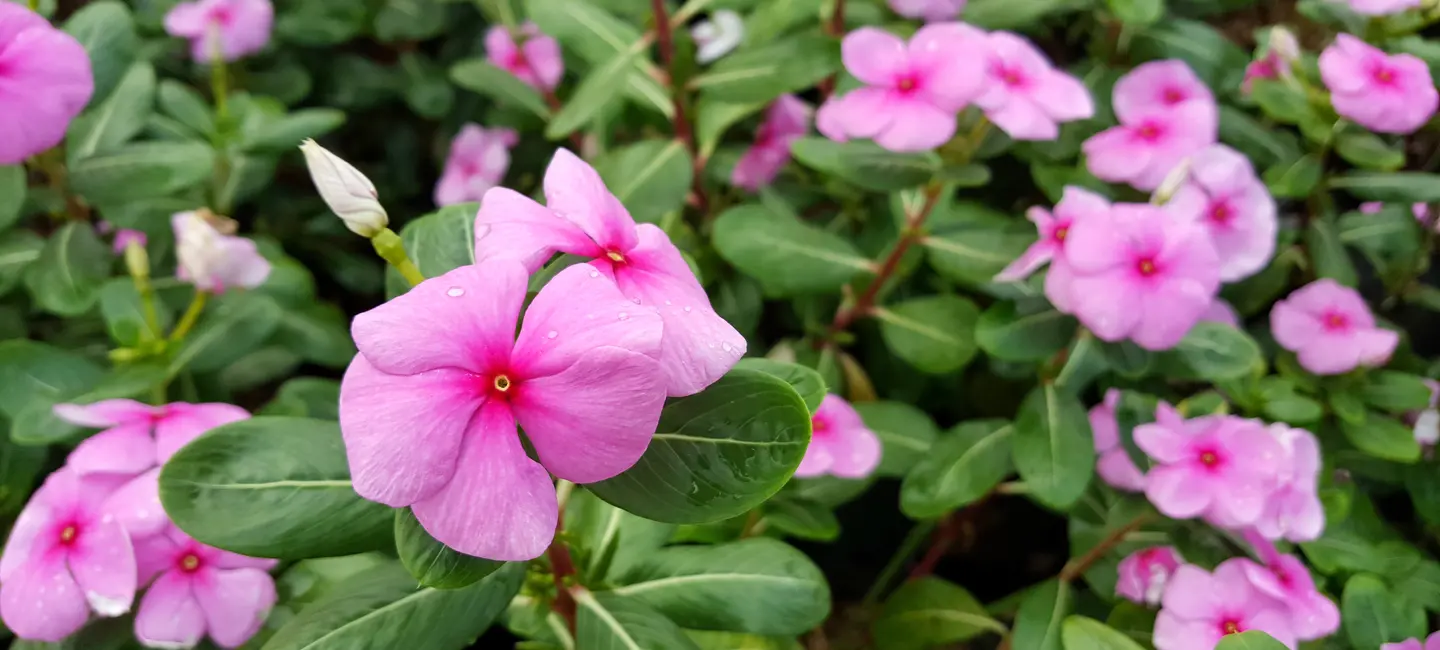
Madagascar periwinkle is a plant. The parts that grow above the ground and the root are used to make medicine.
Madagascar periwinkle is used for diabetes, cancer, sore throat, cough, insect bite, and many other conditions, but there is no good scientific evidence to support these uses. Using Madagascar periwinkle can also be unsafe.
Purified forms of some chemicals found in Madagascar periwinkle are approved by the U.S. Food and Drug Administration (FDA) to be given by injection for the treatment of cancer. These drugs have serious side effects and should be administered only under medical supervision. Madagascar periwinkle is considered unsafe for self-medication.
Is It Effective?
NatMed Pro rates effectiveness based on scientific evidence according to the following scale: Effective, Likely Effective, Possibly Effective, Possibly Ineffective, Likely Ineffective, Ineffective, and Insufficient Evidence to Rate.
- Bleeding.
- Diabetes.
- Cancer.
- Cough.
- Eye irritation.
- Fluid retention.
- Lung congestion.
- Skin infections.
- Sore throat (pharyngitis).
- Other conditions.
More evidence is needed to rate the effectiveness of Madagascar periwinkle for these uses.
Is it Safe?
Madagascar periwinkle might alter the immune system and lower blood sugar and blood pressure.
Vinblastine and vincristine, some chemicals that can be taken out of Madagascar periwinkle, are approved by the US Food and Drug Administration (FDA) for use in chemotherapy. Other chemicals in Madagascar periwinkle might also have anticancer activity, but they have not been well studied.
When taken by mouth: Madagascar periwinkle is LIKELY UNSAFE when taken by mouth due to the presence of poisonous chemicals known as vinca alkaloids. Madagascar periwinkle can cause side effects such as nausea, vomiting, hair loss, hearing loss, dizziness, bleeding, nerve problems, seizures, liver damage, low blood sugar, and even death.
When applied to the skin: There isn't enough reliable information to know if Madagascar periwinkle is safe or what the side effects might be.
Special Precautions & Warnings:
Pregnancy and breast-feeding: It's LIKELY UNSAFE to use Madagascar periwinkle if you are pregnant. It could cause a miscarriage or birth defects. It's also LIKELY UNSAFE to use Madagascar periwinkle if you are breast-feeding because of the poisonous chemicals it contains.
Diabetes: Madagascar periwinkle might lower blood sugar levels. There is some concern that it might lower blood sugar too much in people with diabetes who are using antidiabetes medications. Medication doses might need to be changed.
Surgery: Madagascar periwinkle seems to be able to lower blood sugar levels. Some doctors worry that Madagascar periwinkle might interfere with blood sugar control during and after surgery. Stop using Madagascar periwinkle at least 2 weeks before a scheduled surgery.
Lithium
Interaction Rating=Moderate Be cautious with this combination.
Madagascar periwinkle might have an effect like a water pill or "diuretic." Taking Madagascar periwinkle might decrease how well the body gets rid of lithium. This could increase how much lithium is in the body and result in serious side effects. Talk with your healthcare provider before using this product if you are taking lithium. Your lithium dose might need to be changed.
Medications for diabetes (Antidiabetes drugs)
Interaction Rating=Moderate Be cautious with this combination.
Madagascar periwinkle might decrease blood sugar. Diabetes medications are also used to lower blood sugar. Taking Madagascar periwinkle along with diabetes medications might cause your blood sugar to go too low. Monitor your blood sugar closely. The dose of your diabetes medication might need to be changed.
Some medications used for diabetes include glimepiride (Amaryl), glyburide (DiaBeta, Glynase PresTab, Micronase), insulin, pioglitazone (Actos), rosiglitazone (Avandia), chlorpropamide (Diabinese), glipizide (Glucotrol), tolbutamide (Orinase), and others.
Herbs and supplements that might lower blood sugar: Madagascar periwinkle might lower blood sugar. Using it along with other herbs and supplements that have the same effect might cause blood sugar to drop too low in some people. Some of these products include devil's claw, fenugreek, garlic, guar gum, horse chestnut, Panax ginseng, psyllium, Siberian ginseng, and others.
There are no known interactions with foods.
The appropriate dose of Madagascar periwinkle depends on several factors such as the user's age, health, and several other conditions. At this time there is not enough scientific information to determine an appropriate range of doses for Madagascar periwinkle. Keep in mind that natural products are not always necessarily safe and dosages can be important. Be sure to follow relevant directions on product labels and consult your pharmacist or physician or other healthcare professional before using.
Ammocallis rosea, Cape Periwinkle, Catharanthe, Catharanthus, Catharanthus roseus, Chang Chu Hua, Church-Flower, Lochnera rosea, Magdalena, Myrtle, Old Maid, Periwinkle, Pervenche de Madagascar, Pervenche Rose, Ram-Goat Rose, Ratanjot, Red Periwinkle, Rose Amère, Vinca, Vinca rosea, Vincapervinca de Madagascar.
Information on this website is for informational use only and is not intended to replace professional medical advice, diagnosis, or treatment. While evidence-based, it is not guaranteed to be error-free and is not intended to meet any particular user’s needs or requirements or to cover all possible uses, safety concerns, interactions, outcomes, or adverse effects. Always check with your doctor or other medical professional before making healthcare decisions (including taking any medication) and do not delay or disregard seeking medical advice or treatment based on any information displayed on this website.
© TRC Healthcare 2024. All rights reserved. Use and/or distribution is permitted only pursuant to a valid license or other permission from TRC Healthcare.
